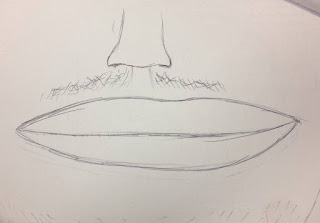HA1 Task 1 - Mark-making Portfolio
Anatomy
Exercise Number 1 - Direct Observation Portraits in Pairs
1. Full Face
Paper: Portrait
Media: Biro
Time: 4 minutes
Left-handed (or right, if left-handed)
Instruction:
Top of head/hair must touch the top edge of the paper, the chin the bottom and the ears each side. Draw loosely and freely adding as much detail as possible.
2. Smile
Paper: Landscape
Media: Biro
Time: 4 minutes
Usual drawing hand
Instruction:
3. Don't Stop
Paper: portrait
Media: coloured marker pen – any colour
Time: 5 minutes
Usual drawing hand
Instruction:
Draw a full face portrait that fills the page, but you may not take the pen off the paper at any point.
4. Blind-folded
Paper: Portrait
Media: Coloured marker pen – any colour
Usual drawing hand
Instruction:
Stare at your subject intently and draw a full face portrait. Do not look at the paper until the time is up.
Exercise Number 2 - Secondary Observation (Selfie) Self-portraits
Take a range of selfies, exploring the expressions below. Choose 6 and take approximately 15 minutes for each one.
Expressions: Happy, Excited, Gloomy, Angry, Confused, Serious
Exercise Number 3 - Manga Facial Expressions
Using the following YouTube Tutorial I have drawn 2 facial expressions using a Manga drawing style.
Exercise Number 4 - Gridded and Scaled Parkour Drawing
In this exercise we used a image that shows a Character from a Parkour as a reference, using the gridding technique I transferred the small A4 reference into a larger image in an A2.
Exercise Number 5 - Template Mythical Creature Drawing
Using secondary template create a coloured freehand mythical creatures made up of the following elements:
Head of a peacock
Wings of a bat
Torso of a Man
Crab Claws
Legs of a Cheetah
Feet of an Eagle
Exercise Number 6 - Expressive Hands Drawing
Using primary observation do the following drawing of your Non-drawing hand:
Anger
Stop
OK
Peace
Exercise Number 7 - Figure Movement Sequence Drawing
Using secondary observation I have done the following activity.
The DSLR camera will be set on multi-shot mode and will capture the movements of myself using the props provided.
After selecting the pictures trace over them.
Exercise Number 8 - Silhouette Figures Drawing
Using a series of dark felt pens, produce a series of figure drawing observed from life that study the pose of the model.
The negative space around the figure is the only thing that has to be drawn, (Not an outline), leaving a silhouette.
Perspective
Exercise Number 1 - Isometric, One, Two and Three Point Perspective Introduction
Introduction of perspective.
Isometric
One-Point
Two-Point
Three-Point
Exercise Number 5 - Template Mythical Creature Drawing
Using secondary template create a coloured freehand mythical creatures made up of the following elements:
Head of a peacock
Wings of a bat
Torso of a Man
Crab Claws
Legs of a Cheetah
Feet of an Eagle
Using primary observation do the following drawing of your Non-drawing hand:
Anger
Stop
OK
Peace
Exercise Number 7 - Figure Movement Sequence Drawing
Using secondary observation I have done the following activity.
The DSLR camera will be set on multi-shot mode and will capture the movements of myself using the props provided.
After selecting the pictures trace over them.
Exercise Number 8 - Silhouette Figures Drawing
Using a series of dark felt pens, produce a series of figure drawing observed from life that study the pose of the model.
The negative space around the figure is the only thing that has to be drawn, (Not an outline), leaving a silhouette.
Perspective
Exercise Number 1 - Isometric, One, Two and Three Point Perspective Introduction
Introduction of perspective.
Isometric
One-Point
Three-Point
Exercise Number 2 - 2-point Perspective Background - Spacestation Video
Using the YouTube tutorial create your own Spacestation using 2-Point Perspective
Exercise Number 3 - Crating Exercises
Using the supplied templates use a crating technique to build a variety of 3D shapes:
Sphere, Pyramid, Cylinder, Cone, Torus


Exercise Number 4 - Crating Application
Using supplies images and a physical pistol as a starting point employ a 2-point perspective crating technique to create your own design of weapon.
Instead of a pistol I have designed a Katana for the Crating application.
Colour
Exercise 1 - Colour Introduction
1. Colour Wheel
Using primary coloured pencils and a cross-hatching technique, complete the colour wheel template. Then idea is to mix the secondary and tertiary colours by overlapping/blending the primary colours.
2. Colour Schemes
Using a full range of coloured markers, decide upon an analogous, complementary and triadic colour scheme and complete the supplied templates.
Ideas Generation
Exercise 1 - Alternative uses for cloth pegs
Visual Communication
Exercise number 1 - How to guide
Create a guide that explains an activity using only images and symbols – NO WORDS. You will need to use the internet to research your chosen activity, both the process and visual aids. Use an A3 sheet to layout your sequence of images. Plan and sketch out your sequence in pencil and then outline it using a biro or fineliner (and coloured pencils or pens if you wish).
Objects
Exercise Number 1 - Paper Tonal Studies
Using the supplied rolls of paper create still life environments and produce a series of four, close-up tonal observational studies of paper constructions using pencil in response to the following themes: Tied, Twisted, Folded, Curled.
Textures
Exercise Number 1 - Willow Charcoal, Soft and Oil Pastels
You are going to draw a series of 9 textures (closely observed abstracted sections of surfaces) from around the college site, three using soft pastels, three using oil pastels and three using willow charcoal. Fold 1 A3 sheet of cartridge paper into 9 to use as your canvas.































No comments:
Post a Comment